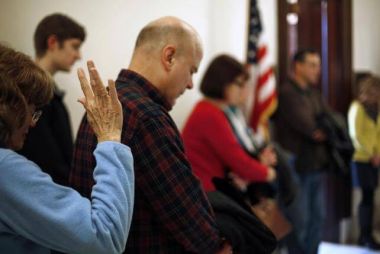Abortion cases down in nearly all US states as teen pregnancies continue to decline

Almost all US states have registered a decline in abortion cases since 2010, including in states where abortion rights are protected, the latest survey showed.
Experts said one major contributing factor has been the decline in teen pregnancies across the country, which reached its lowest level in decades in 2010.
Anti-abortion proponents attributed the result to a shift in the attitudes of society, with more women choosing to carry their pregnancies to term.
On the other hand, abortion-rights advocates said there are fewer abortions because of expanded access to effective contraceptives and a decline in unintended pregnancies.
Several states that have been most aggressive in passing anti-abortion laws — including Indiana, Missouri, Ohio, and Oklahoma — have seen their abortion numbers drop by more than 15 percent since 2010. But more liberal states such as New York, Washington and Oregon also recorded significant drops despite their residents' unrestricted access to abortion, according to the Huffington Post.
The survey used abortion statistics from the health departments of 45 US states. Some states could not submit abortion figures, saying they do compile this kind of data. Among these states are California, Maryland, New Jersey, New Hampshire and Wyoming.
Anti-abortion group Americans United for Life said the decline in abortions was brought about by the change in attitudes of pregnant women.
"There's an entire generation of women who saw a sonogram as their first baby picture. There's an increased awareness of the humanity of the baby before it is born," said president Charmaine Yoest.
Cecille Richards of the pro-abortion group Planned Parenthood Federation of America said, "Better access to birth control and sex education are the biggest factors in reducing unintended pregnancies," More restrictive abortion laws do not reduce the need for abortions."
According to Elizabeth Nash of the Guttmacher Institute, a total of 267 abortion laws have been passed in 31 states since 2011 including banning abortions after 20 weeks of pregnancy.
Louisiana and Michigan, two Republican states which passed anti-abortion laws, have posted the significant increases of 18.5 percent in abortions since 2010.
The increases were attributed to women coming from other states that have new anti-abortion laws.
Anti-abortion groups pointed out that women from Ohio go to Michigan and those from Texas go to Louisiana.
Lori Carpentier, chief executive of Planned Parenthood Mid and South Michigan, said one factor in Michigan's increase was inadequate public funding for family planning.











